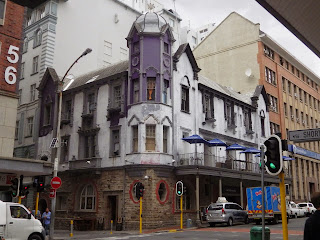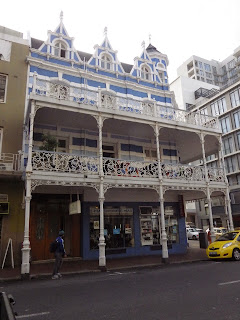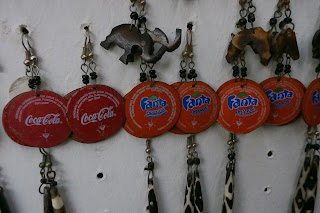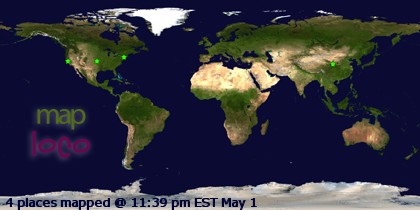 |
| Not from Amsterdam. probably, but I could be wrong |
 |
| Very elegant |
 |
| Just like Stellenbosch |
 |
| Good stuff to eat |
 |
| Elegant gardens |
 |
| Could be New Orleans |
 |
| THAT'S New Orleans |
 |
| That's just loud |
 |
| Juxtaposition: new and old |
 |
| An architecture mix |
 |
| Interesting, plus colour influences from the Bo-Kapp |
 |
| Elegant add ons |
 |
| Kind of a style merger |
 |
| End of my street. Loud bar at night on the 2nd floor |
 |
| Not as imposing as it looks |
 |
| Back to New Orleans |
 |
| Victorian? |
 |
| Oooh, can we shop there? |
 |
| Fire machine guns without a permit? Really? |
 |
| What's under their entrance? |
 |
| A restaurant |
 |
| Sorry again, but it was pretty in real life |
We also wandered into the Bo-Kapp, the city’s original Muslim quarter, with its unique architecture colour palates, which (according to one guide we had) were associated with who lived there. Most of the Muslims arrived as slaves, and they were sorted by ethnicity and ownership into various coloured houses. True? Not sure. According to this, it's because of Ramadan, and according to this, it was to celebrate the end of apartheid. But they look cool.
 |
| Whoa. |
 |
| Striking |
 |
| Not reminiscent of anywhere I have ever been |
 |
| My community would go ape-shit if I had these colours |
 |
| Blocks and blocks of it |
 |
| And the flat roof style works, too |
 |
| Bold |
 |
| Even the mosques are loud |
 |
| On and on |
 |
| Everywhere you look |
 |
| Styling on steep streets |
 |
| I LOVE this |
We also went into a few shops, notably the Pan-African Market and the African Woman’s Market. Both are large buildings that offer small stalls for vendors to sell wares from all over Africa.
 |
| They love masks here |
 |
| And ostrich eggs |
 |
| And stuff out of telephone wire |
 |
| And meerkats |
 |
| And they repurpose EVERYTHING |
=====================
Today’s Africa Travel Tip: Bargaining
Unless you’re in a "proper" store, there are normally no prices on anything. Ask for a price, and they’ll give you a number, but that number is kind of meaningless, and sometimes, they won’t even give you a number.
Today, we were looking at a particular painting, and she gave us a number of R350. That was WAY more than what we thought it was worth, so we said no thanks and turned to walk away. She then almost got mad at us, and said “This is Africa. That’s not the price. In Africa, we negotiate”. Well, normally, I don’t. But that’s what they do here.
No price is fixed. Use whatever bargaining skills you have, but here’s a hint: they’re better at it. Everyone has a “special sale” on today. Stuff is always “almost free”. Stuff is “one of a kind” (like the identical thing you saw in a shop 10 m away). They ask you what you want to pay for something. If you admire something for no other reason other than you admire it, they will show you dozens of things like it. They will give sob stories about how hard life is and how they haven’t made a sale today and they need to eat (while they chat on their cell phones wearing leather jackets).
I’m not an expert, or even knowledgeable about the process. I hate bargaining. But understand it is what they do. I try to be “armed” by looking at many vendors and trying to glean their prices for similar stuff. But good luck. You like to bargain? Africa’s for you.
In the end, Karen was standing firm on R150 for the painting, getting the lady no end of upset, but we agreed to R180 – half the original asking price. And she thanked us, meaning we probably overpaid.


No comments:
Post a Comment